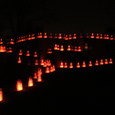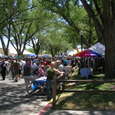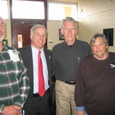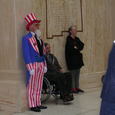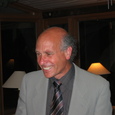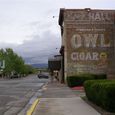« REMINDER: Forum On Election Reform Sat. 11/12 | Main | All Dems Invited: State Party Resolutions Committee Set for 11/15 »
Friday, November 11, 2005
Veteran's Day War Stories
Editor's Note: I've posted a rather long story about my memories of veterans in my family. If you have any you'd like to share on this Veteran's Day, post them in the comments section below.
As I was having my coffee this Veteran's Day morning, memories of family members who served in the military came bubbling up. Many of the men in my family served in the U.S Navy.
My grandfather, Max, was a Navy diver during World War I. He wore one of those unwieldy metal helmets and bulky dive suits of the era, and ended up with a severe case of the bends. According to doctors, this shortened his life considerably, and he died at 45 from liver and kidney problems. I never knew him, but always heard that he never spoke much about his service. By all accounts he returned from the war a changed man, prone to a world-weary wildness during the Roaring Twenties and beyond in a speakeasy-filled Chicago that slid into the brutal throes of the Great Depression.
My Uncle Bob served as a radar man on a Navy destroyer at the tail end of the Korean War. Although he saw some heated shelling and combat on the seas, most of his service consisted of traveling around the globe on post-war good will tours to foreign ports. He would show up back in the old immigrant neighborhood in uniform, on leave, when I was very young. I thought he was the most handsome man in the world in his Navy whites. He never spoke much about the war itself, but was full of yarns about exotic ports of call, characters he had met around the world and rowdy Navy traditions that accompanied nautical events like crossing the equator for the first time. When the winter windows would frost up, he would show off his radar man skill of writing backwards, like radar techs used to do on glass to communicate with those on the other side. He made us giggle and imagine, to lust for travel, for history, for adventure.
My Uncle Vito was a Navy cook during WW II, which instilled in him a lifelong love of cooking. The only problem was he always cooked massive quantities, as he had in the service. This irked my Aunt Esther no end. After all, she was the one left to handle the cleanup mess detail. Uncle Vito's specialities included huge pots of Italian delicacies like snails and clams and dandelion greens and spaghetti sauce made with pigs' feet or chicken necks. I never heard any battle stories out of him. He, too, died young. Of a heart attack, while tending his garden, with his tiny grandson toddling nearby. Just like Brando's Godfather in the movie.
My uncle Artie served in the WW II Army infantry in Italy. He had some fingers blown off when he grabbed a live grenade and tossed it away from himself and his fellow soldiers, no doubt saving lives. He had little feeling in that hand and was always suffering unexpected cuts and burns on it during his factory work. Looking at the mashed results of the grenade always scared me. He'd just laugh and say, "oh, it's nothing. I'm alive!"
I know the most about the military service of my late father, Bill, who joined the Navy during World War II and was quickly attached to the Marines as a medical corpsman. He was 21 years old. After a short course of rushed medical training, he eventually ended up in the truly horrific beach landing and battle for Iwo Jima in the Pacific. He, too, was very reticent to talk about his service, but over the years I managed to piece together some facts about it. Most of his fellow corpsmen didn't make it out alive. The Japanese forces had a strategy of wounding Marines in order to draw out the medics to come to their rescue. Then they'd proceed to kill the medics.
At Thanksgiving, the smell of the turkey being prepared somehow reminded my dad of the smell of flesh during the Marine's long "mop-up" of the labyrinth of caves and underground tunnels on Iwo, using flame throwers and explosives to destroy the Japanese military survivors who wouldn't surrender. He always got slightly sick with memories for a time on this day and could never stay in the kitchen for long.
On rare occasions my dad would allow us to examine some of the souvenires he brought home from the war. Wrinkled Japanese paper money and darkened coins, an ornate Japanese comb, his medals, photos from bootcamp and of servicemen playing volleyball on Hawaiian beaches and standing outside their tents on Okinawa, a Marine yearbook, a small Rising Sun flag, a thick piece of window glass from a downed plane made into a heart with a piece of metal down the center that created a rainbow effect when held up to the light. As a child these things always smelled ancient to me, with a strong undertone of ruin and mystery. My father always handled them with sad reverence rather than joy or pride. Melancholy would seem to overwhelm him, and he'd quickly put the memorabilia away and become silent.
When I was older, I'd sometimes question him about his war experiences, and once in a great while he'd speak about them quietly. About the feelings of extreme helplessness when he had been unable to do much when Marines he knew were dying in incredible pain in his arms. Of the intestines erupting from live bodies and missing, bleeding limbs and atrocious head injuries and other serious wounds he had to try and patch with only a yeoman's level of medical experience and knowledge. Of the strange fungi that latched onto Marines on Iwo, eating their flesh during the 36-day battle on hot, ashy, lava soil, with no chance to wash or change your clothes or socks. Sometimes Marines endured holes caused by fungus that went right through their torsos. My dad, himself, had a permanent case of fungus on his feet from the battle. I can still see him soaking his feet every night in a basin of hot water and epsom salts.
The only time I heard any happy war stories from him was when we once paid a visit to one of his fellow corpsmen from Iwo Jima in Chattanooga, Tennessee. Corpsman Wright was more than 6 feet tall and kept his Jack Daniels in the Frigerator and his bad memories at bay. When the adults had a few whiskey highballs on our first night there, funny stories about youthful escapades in the Marines tumbled out one after another. We were fascinated with tales of my dad being rowdy and risque, a sharp contrast to the straightlaced and responsible father we knew, loved and sometimes even feared. I remember clearly how my father blushed during the retellings.
As the night wore on, however, both my father and his Marine buddy became more and more morose and depressed. After that first night, no more war stories were shared. It became so powerfully clear to me, as a 14-year old, how many intense and conflicting emotions were connected to their war experiences. I'm sure many veterans are in the throes of similar emotional knots on any Veteran's Day, including this one. As are their families.
This conflict came to a head for many vets during the Viet Nam War. I remember so many angry and volatile discussions between my brother and I and my dad about Viet Nam and what true patriotism demanded from Americans. So much division in the nation and in its families. Yet, as the war progressed, my father changed his mind. I thought it showed alot of courage. He and my mom ended up traveling to Washington to participate in one of the huge antiwar marches in the late 60s. My father carried one of his medals when he marched. And a large American flag.
Corpsman Wright died young at 56 from chronic alcoholism. My dad died at 55 from stomach cancer. I can't help but think that their painful and profound war experiences were a primary cause of their early deaths, and of their often uncomfortable emotional lives. As my father grew closer to death, he insisted that only one person he knew would be right for the task of conducting a service when he passed. He was one of his surviving friends from the medical corps -- a man who was unable or unwilling to deal with the rough and tumble of the business world after Iwo, and who had become a missionary of sorts after the war.
The reverend and his wife served in various missions built to minister to street people, the poor, alcoholics and vets down on their luck. My father wasn't a religious man, though his spiritual and humanist tendencies were strong. He wanted his old comrade to conduct the memorial service not because of the minister's religious standing but because, even after all the intervening years, he felt closest to those who had intimately shared his service and suffering during the war.
The reverend did conduct the memorial service, and gave quite an eloquent speech about what the medics had witnessed and the confusing emotional aftermath that unfolded afterwards. It was held in one of those well-used missions filled with stories of woe and redemption. My brother and his musician friends performed George Harrison's 'My Sweet Lord' after the speech. My dad's old friends sang the Marine Hymn. Like the convoluted feelings of vets and their families, like the coexisting pain and pride of service caused by war, like the continuing conflicting views about using force or not, the memorial service was a juxtaposition of opposing elements. A jumble of contrasting traditions. A metaphor for another Veteran's Day mired in another grinding war and rememberances of the wounds gone unhealed from the ones that came before. War is over if you want it. Peace.
November 11, 2005 at 02:03 PM in Current Affairs | Permalink
Comments
Very moving. Thanks for sharing these stories. I'm sure most of us have our own versions. We can honor our vets without supporting the Iraq War itself. Must be remembered.
Posted by: Pam | Nov 12, 2005 1:38:24 PM


